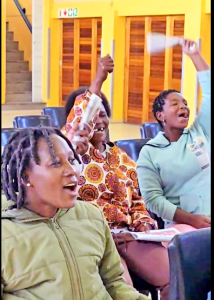
Communist Conference here ♦ Letter: Quantity and Quality here ♦
South Africa: Comrades Learn to Change Society
PORT ELIZABETH (South Africa), May 31— We recently held a conference with comrades from Uitenhage and Port Elizabeth to study dialectical materialism.
It started on Friday. Comrades gathered and made their way to the venue in happy spirits, united and with a lot of eagerness to learn. That night we briefed all comrades about the weekend’s activities. We stressed the importance of participation of all comrades. We encouraged comrades to ask questions and engage as much as possible to create an environment conducive to learning.
We were all there to learn more about communism and how we can go about building a communist society. One comrade began, “We are here to change society, to change capitalism to a communist society. Therefore, this gathering is about understanding how we can effect that change. Is it even possible?”
An experienced comrade asked, “Is change possible?”
“Yes, it is,” comrade M answered, “if we work together united and grow to a big number”.
What can dialectical materialism teach us about change? What can we understand about dialectical materialism? What can we practically do with the knowledge we gained?
We divided into two groups. Each group had the task of reading, explaining, making examples, and relating some of the examples to our everyday lives in order for the comrades to better understand what is meant.
We often come across words that sound like jargon and are not easily understood. But after discussions they became clear. For example, we came across “dialectical contradictions”. This sounded technical and complicated. But one comrade explained using examples of a football match and worker and boss contradiction.
He said, “We live in a capitalist society in which there are bosses and workers. These people are opposites, but they are united in that they need each other for an enterprise to function in a capitalist society. But they are also in conflict when it comes to money. The worker wants more pay while the boss wants to pay less. This is an example of a dialectical contradiction”. Many comrades understood this example as they lived it every day at work.
The comrades engaged very well with the experienced comrades who facilitated the discussions. They did a wonderful job of explaining the communist agenda and the change we are trying to bring.
One facilitator explained some contradictions of communism as internal and external. He said, “The internal contradictions are primary and will largely determine how we respond to the external contradictions”.
A new comrade responded, “You mean, if we are strong internally, outside forces will have little impact on us. So, we need to be aware of what our internal contradictions or forces are, and which are our own strengths and our own shortcomings and how we can improve them”?
A very curious comrade asked, “Can we then liken this example to doing a ‘SWOT’ analysis, where we need to identify Strengths and Weaknesses which will be internal and Opportunities and Threats which will be external”? This was a great example. It was understood by all comrades. The question meant that the comrades were getting the idea of exactly what was being discussed in how we can do practical things in building a communist society.
After a break, all comrades were excited to get back in the big group and share our experiences in our smaller groups.
The conference was overall a great success. All comrades participated and showed tremendous commitment in different ways. Some comrades cooked, others served food, and others washed dishes. Another comrade even woke up early to wake comrades up to ensure that all comrades were punctual for the upcoming day’s events in true communist style.
We will continue to learn and use dialectical materialism to sharpen our political line and understanding. As well as to apply what we learn when we mobilise and recruit comrades to join ICWP and fight for a communist society.
Letter: Rising Crime: A Qualitative Change?
Our group at the recent Dialectical Materialism conference in South Africa discussed how quantitative changes can produce qualitative changes. How changes in “amount” can produce changes in “kind.” For example, as a pot of porridge is stirred, its texture changes bit by bit. You don’t even notice the small changes. Then, “all of a sudden,” the porridge thickens. Its quality changes from a mush to a solid.
Another example made us think harder. Everyone agrees that there is more crime now than there was ten years ago. Or even five years ago. The quantity of crime has increased. Has that created a qualitative change? How do we know?
The article we were reading said, “A qualitative change is a big shift in the way something behaves, a shift that often makes us act differently toward it.” Comrades agreed that they acted differently now toward crime. That led us to conclude that there has been a qualitative change, “a kind of break or jump in a process.”
We continued reading the article. But a big question remains. How do comrades act differently now?
Are the changes mainly in how we act individually? Do some changes involve collective actions? Could they? Are there ways we can help friends, family, and neighbors respond to crime that would increase understanding of our communist politics?
These questions aren’t just for the comrades in South Africa. Many of us face similar problems elsewhere. Though not always as urgently. I hope others will discuss and write about this.
— Comrade B
More on Communist Philosophy here


